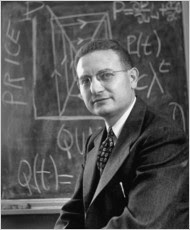Paul Samuelson dies at 94
Paul Samuelson, the great American economist, one of the true masters in the history of economics in the 20th century, along with J. M. Keynes, F. Hayek, Milton Friedman, dies at 94 yesterday (Dec. 13th) at his Belmont MA home. Here is eulogy piece from NYT:
His death was announced by the Massachusetts Institute of Technology, which Mr. Samuelson helped build into one of the world’s great centers of graduate education in economics.
In receiving the Nobel Prize in 1970, Mr. Samuelson was credited with transforming his discipline from one that ruminates about economic issues to one that solves problems, answering questions about cause and effect with mathematical rigor and clarity.
When economists “sit down with a piece of paper to calculate or analyze something, you would have to say that no one was more important in providing the tools they use and the ideas that they employ than Paul Samuelson,” said Robert M. Solow, a fellow Nobel laureate and colleague of Mr. Samuelson’s at M.I.T.
…
Mr. Samuelson wrote one of the most widely used college textbooks in the history of American education. The book, “Economics,” first published in 1948, was the nation’s best-selling textbook for nearly 30 years. Translated into 20 languages, it was selling 50,000 copies a year a half century after it first appeared.
…
A historian could well tell the story of 20th-century public debate over economic policy in America through the jousting between Mr. Samuelson and Milton Friedman, who won the Nobel in 1976. Mr. Samuelson said the two had almost always disagreed with each other but had remained friends. They met in 1933 at the University of Chicago, when Mr. Samuelson was an undergraduate and Mr. Friedman a graduate student.
Unlike the liberal Mr. Samuelson, the conservative Mr. Friedman opposed active government participation in most areas of the economy except national defense and law enforcement. He thought private enterprise and competition could do better and that government controls posed risks to individual freedoms.
Both men were fluid speakers as well as writers, and they debated often in public forums, in testimony before Congressional committees, in op-ed articles and in columns each of them wrote for Newsweek magazine. But Mr. Samuelson said he always had fear in his heart when he prepared for combat with Mr. Friedman, a formidably engaging debater.
“If you looked at a transcript afterward, it might seem clear that you had won the debate on points,” he said. “But somehow, with members of the audience, you always seemed to come off as elite, and Milton seemed to have won the day.”
Mr. Samuelson said he had never regarded Keynesianism as a religion, and he criticized some of his liberal colleagues for seeming to do so, earning himself, late in life, the label “l’enfant terrible emeritus.” The experience of nations in the second half of the century, he said, had diminished his optimism about the ability of government to perform miracles.
If government gets too big, and too great a portion of the nation’s income passes through it, he said, government becomes inefficient and unresponsive to the human needs “we do-gooders extol,” and thus risks infringing on freedoms.
But, he said, no serious political or economic thinker would reject the fundamental Keynesian idea that a benevolent democratic government must do what it can to avert economic trouble in areas the free markets cannot. Neither government alone nor the markets alone, he said, could serve the public welfare without help from the other.
As nations became locked in global competition, and as the computerization of the workplace created daunting employment problems, he agreed with the economic conservatives in advocating that American corporations must stay lean and efficient and follow the general dictates of the free market.
But he warned that the harshness of the marketplace had to be tempered and that corporate downsizing and the reduction of government programs “must be done with a heart.”
Despite his celebrated accomplishments, Mr. Samuelson preached and practiced humility. The M.I.T. economics department became famous for collegiality, in no small part because no one else could play prima donna if Mr. Samuelson refused the role, and, of course, he did. Economists, he told his students, as Churchill said of political colleagues, “have much to be humble about.”



![Reblog this post [with Zemanta]](https://img.zemanta.com/reblog_e.png?x-id=b69228cc-102f-4691-ac06-00b6a6bc7128)